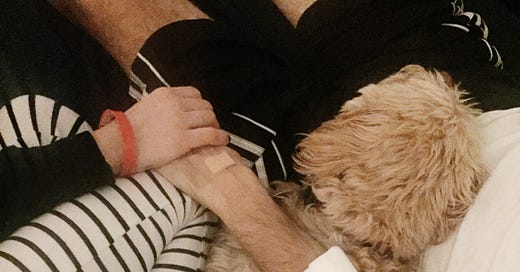Welcome to the “Hello, From the Other Side” series, a (non)advice column from someone who's been there and (currently) lives to tell the story. This is one person’s perspective to help shed light on the grief experience and to help others feel less alone.
Please note that I am not a therapist. I don’t have any official expertise, but I do have experience. Lots and lots of experience
Q: A very close friend is dying. She has asked me why I haven't talked to her about death and said she doesn't feel supported. I've explained that I've never done this before and I'll do better. Do you have any suggestions for questions I can ask that might be open-ended enough to let her speak freely about death? I'm comfortable talking with her about it but was letting her lead - and that isn't what she wants. - Tip-Toeing Lightly
Dear Tip-Toeing,
First of all, I am so sorry that both you and your friend are going through this. It’s impossibly difficult for all parties involved when dealing with a terminal diagnosis. It tests our relationships, our priorities, our strength, and most of all, our hearts.
I have so much respect for your friend for being able to vocalize how she's feeling and for you for wanting to be better for her. It sounds like your friend is open to - and, more importantly - wanting to have conversations about death. I would worry less about asking the "right" questions and more about creating the space for her to process her reality.
What I know from my own cancer experience (although not a terminal one), as well as countless campfire conversations with other young adults with cancer, is that most feel avoided, isolated, and out of sync with their peers. At a time when they need to be supported most, they are met with distance and space. Those who do show up, seem to fill the air with platitudes and toxic positivity, like false declarations that “you will beat this!”1
It’s uncomfortable talking about mortality. It’s awkward and heartbreaking and forces us to confront death openly (something we’re not taught how to do).
But it’s even more uncomfortable for the person confronting their own mortality without the proper support. Leaving them without the space to talk about it.
When Brad was given his terminal diagnosis, even those who came to visit, avoided the elephant in the room. Without acknowledging that he was dying, it made it difficult to have any real conversations with depth. And when time is limited, focusing solely on shallow topics can be frustrating.
Your friend has bravely opened the door for you. Dive in. Share your thoughts, fears, and curiosities. And then ask her to do the same.
For concrete ideas, here are a few questions that were important to Brad:
“How do you want to be remembered?”
“Any specific way we can honor you after you've died?”
“How can we honor your life now while you're here?”
And, simplest of all, "How can I best support you?"
As Brad used to say, "Don't treat me with kid gloves." Bring the humor, acknowledge the shit, and have the hard conversations.
And when there aren’t any words, sit in the silence alongside your friend.
Every person is different when it comes to facing the end2, so it’s up to you to decide how much tip-toeing you need to do. But if she’s asking you to open up, I’d encourage you to do so, with kindness, curiosity, and empathy.
Anything you would add? Tell us in the comments below.
“Maybe You’ll Get Hit By a Bus” - Brad, to me, when talking about his death
If you’d like an example on how to (clumsily) have the conversation, here is a recording of Brad, me, and his best friend talking about Brad’s mortality. It’s raw, it’s emotional, it’s imperfect, and it’s real.
This was one of the hardest conversations we recorded, and afterwards, was the conversation that gave Brad the most relief (and the conversation he was most proud of). It gave us permission to ask other tough questions. If you’re interested in listening to more of these conversations, you can find them all on the Defending Your Life website.
Have a question for a future column? Ask it here.
Looking for a community of others who get it? Consider joining the Forced Joy Club.
A statement everyone hopes to be true, but leaves little room for conversations about the alternative - that maybe they won’t.
My dad avoided the fact that he was dying and preferred not to talk about it, which my family (mostly) respected.






Thank you for sharing the audio of the conversation with Brad. It was such a sad and difficult, yet beautiful conversation.
Dana, thanks so much for sharing this audio